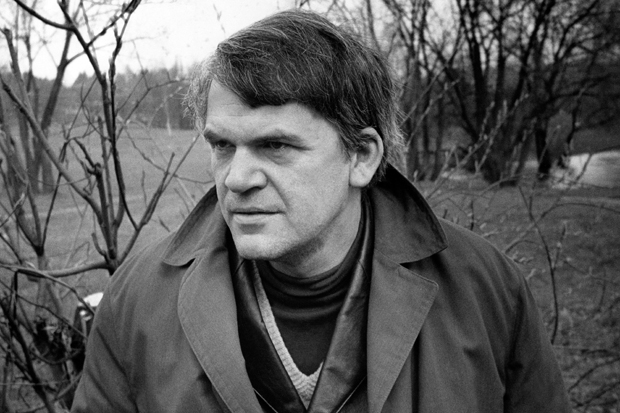We begin in Paris with an introduction to five insignificant friends. One (Ramon) is walking past the new Chagall exhibition, but decides against visiting — not for the first time, nor the last — because of the queues. Another (D’Ardelo) is returning from the doctor’s, where he has learned that he does not have cancer — though he tells Ramon he does. Ramon’s friend Charles is a party organiser, who will soon be catering D’Ardelo’s birthday party. He does this with his friend Caliban, an actor without an acting career, who while on duty tries to make himself more interesting than he actually is by pretending to be an immigrant speaking only a meaningless gobbledegook he calls ‘Pakistani’. (It doesn’t work.) And then there’s Alain, who has mother abandonment issues, and who is going through a phase of obsessing rather obviously over the female navel.
What follows this introduction to our ‘heroes’ — all of them male, significantly — is a slight collection of trivial narrative moments, constructed to allow their
puppet-master novelist to dance around what he hopes to say. His subject today? Insignificance. (This particular novelist has never been afraid of abstract nouns.)
The Festival of Insignificance is Milan Kundera’s first novel in more than a decade. The title marks out the book’s thematic territory, but it also reveals much about the authorial attitude: it’s risk-taking (just how interesting to a reader do you expect a celebration of the insignificant to be?) but utterly, defiantly selfconscious with it. The question is, is there a pay-off worth that risk? Shadowing these friends’ stories is an anecdote about Stalin going partridge-shooting, and his meetings with officials in the Kremlin, in particular the pitiful, prostate-suffering Kalinin; the dextrous weaving of his mad world into that of the Parisian friends is certainly part of the novel’s pay-off.
Kundera’s characters, such as they are, don’t merely live lives of representative triviality, they also articulate — quite explicitly, expressly — a search for meaning their creator is reluctant to give them. Most struggle against insignificance; only Ramon discovers the pleasures of embracing it, in his quest for that most insipid thing, ‘a good mood’. To our intrusive author it’s all a game, clearly, because he’s also teasing his readers, challenging us to seek out meanings (as is our habit) where there are none. There are suggestively symbolic moments, and a lot of surface, but look for deeper significance behind it and you’ll find — quite deliberately — there’s nothing there… Maybe the joke’s on us? (Though we are, it’s suggested, in a ‘post-joke age’. This from the writer who launched his career 48 years ago with The Joke.)
Naturally, Kundera is a writer with incomparable style — or perhaps, Style. Where pleasures are to be found in this book, they’re in the finely-crafted reminders of what that style of his can do. And as you’d expect, The Festival of Insignificance is clever. But the cleverness is unsatisfying, and style alone is not enough. Of course, nobody reads Kundera, the most notorious denier of the show-don’t-tell creed, for dynamic plot or rich, human characterisation; but with characters this characterless you need some high-voltage intellectual thrills, or wit, or at least a sense of sheer fun to make up for that wilful lack of affect. Instead we have something faintly sad, with enthusiasm that’s skittish at best, some philosophical name-dropping and an uncompromising resistance to any trace of seriousness. (Which is the point, yes, but that hardly helps…) It’s a wander around ideas of insignificance that’s restrained, distant and mildly thought-provoking, brief and careful rather than playful, abundant or energetic, which as festivals go is no fun at all.






Comments